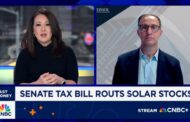The sports world is coming to Las Vegas. And it’s not stopping.
In the span of a few months, Sin City will have hosted Super Bowl LVIII (on Feb. 11), a Formula One race (on Nov. 18) and home dates for the defending champion Golden Knights of the NHL and Aces of the WNBA. The Ultimate Fighting Championship is growing in influence and baseball’s Oakland A’s are on the way, as is a presumed NBA franchise. The city will host the NCAA Final Four games in 2028.
The crown jewel for Las Vegas is a $10 billion project due to be completed in 2028 that includes an NBA arena, a hotel and resort and a high-speed rail system connecting the city to Los Angeles.
“We are at the intersection of a massively intertwined fun economy of tourism, sports and entertainment,” Bo Bernhard, vice president of economic development at the University of Nevada, Las Vegas, said in an interview.
That convergence, he said, adds up to a staggering $13.7 trillion — equivalent to 14% of the global economy, roughly nine times the size of Big Pharma and nearly five times the size of the global automobile industry. The size of the global sports economy mushroomed to $2.65 trillion in 2023 from $2.3 trillion in 2019.
Bernhard, a former Division I athlete in baseball and soccer at Harvard University, is on the front lines of a flourishing sports-innovation movement emanating from UNLV that is radically remaking how athletes train — and how consumers experience events.
Computerized soccer cleats, e-sports arenas and new card games are among the creations coming out of Black Fire Innovation, a 100,000-square-foot facility in south Las Vegas that is overseen by Bernhard and that has been compared to innovation hubs such as North Carolina’s Research Triangle, the University of Texas at Austin and Silicon Valley’s Stanford University.
The athletic strides Las Vegas is making are paralleling a tech boom in southern Nevada that has seen a recent influx of artificial-intelligence startups.
Read more: Beyond the glitz of CES, Las Vegas is quietly building a sustainable tech scene
Partnering with LG Electronics
066570,
-0.32%,
Panasonic
6752,
-2.77%,
Intel
INTC,
-1.14%,
Caesars Entertainment
CZR,
-2.15%
and others, Black Fire has been a source of ideas and advice for major sports franchises and colleges. It was Bernhard who took the call from then-Oakland Raiders owner Mark Davis in 2016 that ultimately led to the team’s move to Las Vegas.
Sporting events in Las Vegas generated $1.845 billion in revenue in fiscal 2022, and 39 significant events or tournaments are scheduled in the region in 2024, according to UNLV’s Center for Business and Economic Research.
“This city is on the cusp of doing what Detroit did with the auto industry, and Houston and Dallas did because of oil,” Bernhard said.













